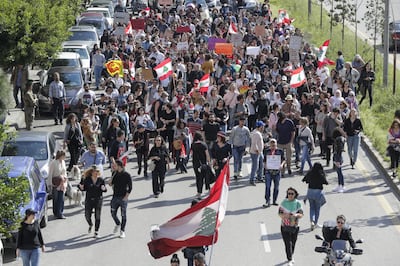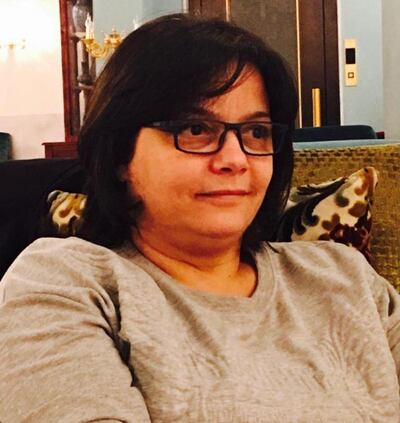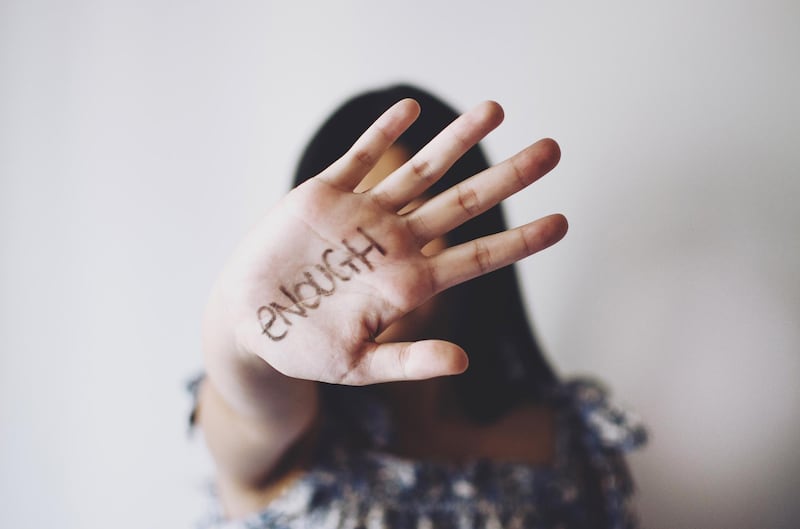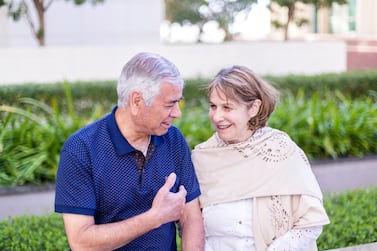Sara* went from being a passionate newlywed, who fought everything and everyone around her in the name of love, to becoming a victim of violence within a matter of months.
Unfortunately, this Lebanese woman's story is not uncommon.
Married for four months and beaten three times, Sara describes walking into a trap “with her own two feet” and ending up in a marriage that is the opposite of what she envisioned.
She sought safety and support from her family but was met by a wall of silence, a wall they wished to hide behind for fear of societal judgment.
"The ugliest part was my family telling me they're here for me, but that they don't want me to talk about it because they're scared of what people would say," she tells The National.
“I’ve been hurt once and twice and thrice, and I can’t be with this human any more. You think I care what people would say?”

Sara, who is now in her late thirties, had to battle against the opinions of almost everyone around her for years to end up with the man she loved. As they came from different religious sects and backgrounds, she had to break down many barriers, including her own family’s disapproval, simply to be with him.
When her short-lived honeymoon phase came to an end, and her husband showed his true colours, her family was quick to blame her for his aggressive behaviour.
“I get a lot of comments saying, ‘No one forced her to marry, we all warned her, we tried to tell her, she didn’t listen, she should pay the price.’”
But justifications for domestic violence in Lebanon only pave the way for more abuse, argue activists.
Justice for all
“It never starts with murder,” says Amal*, another survivor. “First he begins yelling at you and you get used to it, then he starts insulting you and you get used to it. Then he hits you, and you say maybe it’s a one-time thing. Eventually he kills you.”
The killing of women in Lebanon has been prominent in the news recently, following a surge in domestic violence cases. Crimes against women in the country increased by 107 per cent in 2020 compared to 2019, according to online feminist platform Sharika Wa Laken.
And the cases are still coming in 2021. Zeina Kanjo, Ahkam Derbas and Widad Hassoun: these three women met the same fate within one week, as they were all killed at the hands of a male relative earlier this year. Victims of violence and soon-to-be-forgotten names on a long list of women who preceded them, many of whose families are still waiting for justice to take its course.
Crimes against women in Lebanon have long been downplayed. Fits of anger, “honour” crimes and personal conflicts are among the most common justifications.
Manal Assi
— Charbel Frem (@Charbelpfrem) February 12, 2021
Zeina Kanjo
Rana Beaino
Manal Timani
Nissrine Rouhana
All killed by their husbands
Say their names#إسمها_جريمة pic.twitter.com/9XAgUiI0kl
This was the subject of a recent campaign launched by feminist activists in Lebanon entitled It’s Called a Crime ahead of International Women's Day on March 8. The associated hashtag went viral on social media as the campaign sought to condemn the normalisation of crimes against women.
“A man decided to end a woman’s life, full stop. There’s no argument here or questions asked why,” said Alia Awada, co-director of Fe-Male, a prominent feminist NGO in Lebanon, which was behind the campaign.
“It’s a crime that should be punished according to the law without trying to justify it.”

Another challenge facing women in Lebanon is the delay in tackling domestic violence reports, says Awada.
Updates to laws offer protection to women
Lawyer Danielle Howayek, who works with Abaad, a local NGO that offers protection and support services to both women and men, explains that Lebanon does not struggle with a lack of protective laws, but rather a lack of accountability.
“We have a culture of evading justice,” says Howayek. “People just get away with things, which makes us believe we don’t have sufficient laws, but we do.”
In December 2020, Lebanon’s legislative system amended Law No 293, aimed at protecting women and other family members from domestic violence, to be more inclusive.
The law was revised to cover “violence related to – but not necessarily committed during – marriage”. This, according to Howayek, gives protection to women from violence instigated by their ex-husbands in case of divorce.
Another amendment raised the custody age of children to 12 years, which “helps women leave their abusive partners and take their children with them, without being blackmailed”, Howayek explains.
These amendments were issued alongside another landmark law in Lebanon that criminalises sexual harassment, “especially in the workplace”.
Although these laws provide a decent legal framework for the protection of women, not many survivors take their struggles to the court.
Take Hala*, for example, who had been subjected to domestic violence by her husband and yet never involved the authorities, because she “had no one”.
“Zeina died as I was shutting her up [i.e. claiming an accident], just as any man shuts his wife up”. #Lebanon has a very deep problem with domestic and gender-based violence and abuse as reports of murders of women are horrifically increasing in numbers. #اسمها_جريمه pic.twitter.com/lL0RpDa9Fz
— Halim Shebaya (حليم شبيعة) (@halimshebaya) February 12, 2021
Living with her husband and his sister under one roof to cut down on costs during the economic crisis that hit Lebanon during the summer of 2020, Hala’s marital problems soon turned into a pattern of violence. It was only recently that their relationship was remedied with the support of Abaad.
Like many others, Hala’s husband had spent the majority of his time at home during lockdown, and so she was trapped with her abuser.
Lockdowns exacerbate violent behaviour
The UN described the global increase of domestic violence against women during national lockdowns as a “shadow pandemic”. According to the UN Population Fund, Covid-19 is likely to cause a “one-third reduction in progress towards ending gender-based violence by 2030 globally”, including in Arab countries.
UN Women also recorded a 50 to 60 per cent increase of gender-based violence in the Arab world.
“Confinement is increasing isolation for women with violent partners, separating them from the people and resources that can best help them. It’s a perfect storm for controlling, violent behaviour behind closed doors,” wrote Phumzile Mlambo-Ngcuka, executive director of UN Women, in a statement.
But Lebanon’s lockdown comes with an additional socio-economic strain that has driven crime rates through the roof, including violence against women.
Internal Security Forces in Lebanon recorded 116 calls to their domestic violence hotline in January 2021 alone. This is a 45 per cent increase from calls received in January 2020, according to ISF numbers. In general, reports of domestic violence to the ISF soared by 96 per cent from the beginning of the pandemic, says Awada.

“These are numbers based on women who are reporting violence, let alone those who are silent,” says Awada.
According to the activist, the types of calls received at domestic violence hotlines have changed, too. Initially, they were often requests for help or consultation. Recently, there have been direct pleas from women asking for protection.
Sharika Wa Laken, an online platform founded by Fe-Male, recorded 13 crimes against women in 2019, 27 in 2020 and four in the first two months of 2021.
"Many women are struggling behind closed doors," tweeted Hayat Mirshad, co-founder of Fe-Male and editor-in-chief at Sharika Wa Laken. "Domestic violence is a cause for all women."
مبارح كانت رولا ومنال ورقية وزينة ولارا وغيرهن من النساء اللي عرفنا عنهن، وكتار عم يتعنفن ويعانين بالعتمة وخلف الأبواب المغلقة!بكرا يمكن تكوني إنتي، أنا أو أي إمرأة منا. قضية العنف الأسري، قضية كل النساء! الصور أدناه توضح الواقع في لبنان بالأرقام 👇 #إسمها_جريمة@Sharika_walaken pic.twitter.com/p5Fxdepjip
— Hayat Mirshad (@HayatMirshad) February 12, 2021
What the future may hold
One grassroots solution to potentially put an end to domestic violence and discrimination against women in Lebanon is the implementation of a unified personal status law, devoid of any religious or cultural interventions, says Aya Majzoub, Lebanon and Bahrain researcher for Human Rights Watch.
According to a UN report, Lebanon lacks a civil code that regulates personal status matters such as marriage, inheritance and child custody. Instead, it relies on 15 separate religious-based personal status laws and courts for the 18 recognised sects in the country. As a result, individuals are often treated differently because of their religion and gender.
That's why the UN, in co-operation with local feminist NGOs, has called for the implementation of a unified and gender-sensitive personal status law that puts an end to legal, social and economic discrimination against women.
In terms of international standards, however, Lebanon still has a long way to go to ensure full equality and protection of women, Majzoub adds.
“The laws around women's protection don't acknowledge the society we live in or the power dynamics between male and female. The aim is not only to hold perpetrators accountable after acts of violence, but also to prevent violence from the start.”
The researcher explains that Lebanon is still lagging in terms of inclusivity, namely by failing to protect children and migrant workers.
“Recent law amendments are good, but they still don’t criminalise marital rape or child marriage,” she explains. “We also need to be campaigning for migrant workers’ rights, 98 per cent of whom are women subject to exploitation, abuse, slavery and human trafficking.”
For people like Sara, Amal and Hala, it is simply not enough.
*Names have been changed for privacy







